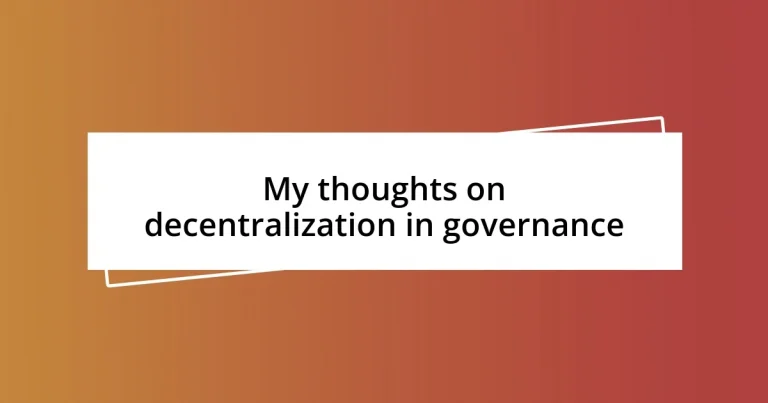Key takeaways:
- Decentralization empowers local communities by enhancing participation and accountability, allowing decisions to be made by those who understand local needs.
- Challenges in decentralization include inconsistent resource allocation, varying capacities of local leaders, and the need for balance between local autonomy and regional coherence.
- Future governance will likely leverage digital platforms for citizen engagement, prioritize collaborative models, and focus on sustainability and social equity.
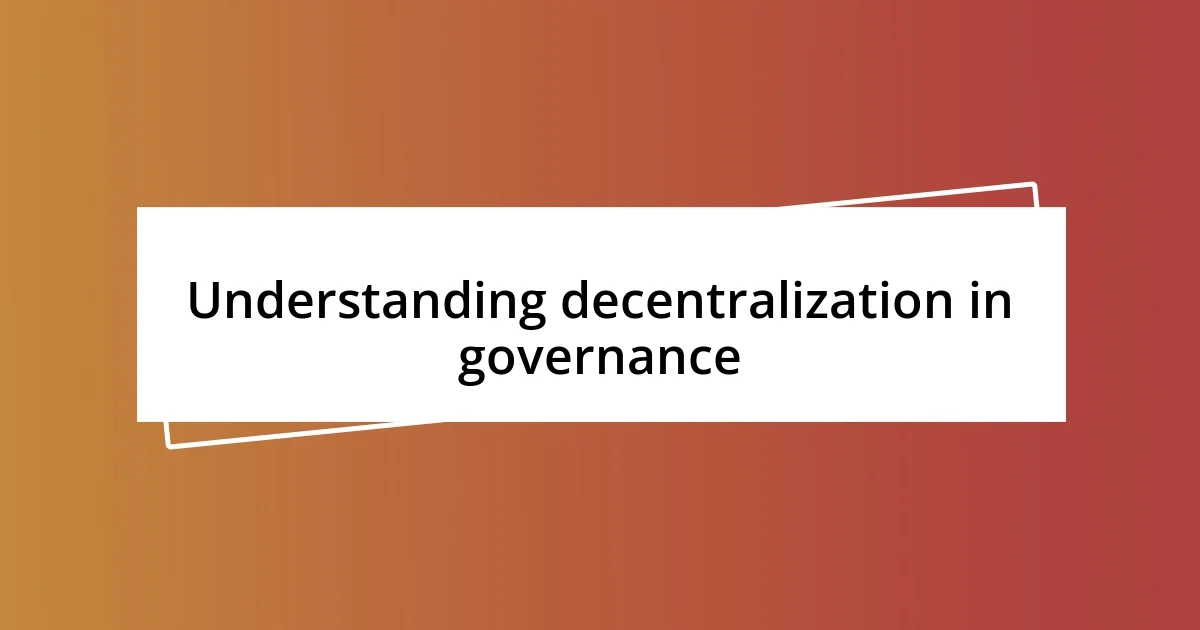
Understanding decentralization in governance
Decentralization in governance refers to the transfer of authority and responsibility from centralized institutions to local or regional entities. When I first heard about it, I was struck by how it can empower communities, allowing them to make decisions that directly affect their lives. Can you imagine living in a place where the decisions are made by people who truly understand your needs?
One of the most compelling aspects of decentralization is its ability to enhance local participation in the democratic process. I remember attending a town hall meeting where a diverse group of residents shared their concerns and suggestions. It was inspiring to see how engaged everyone was, nurturing a sense of ownership over the local governance structure. That experience made me realize that when people have a voice, the outcomes tend to be more relevant and effective.
However, I often wonder about the balance between local autonomy and the need for overarching coordination. There are definitely challenges, such as ensuring that all communities have the same level of resources and capacity to participate. It’s a complex dance, but I believe that the potential benefits of decentralization, like increased accountability and responsiveness, make it a worthy pursuit.
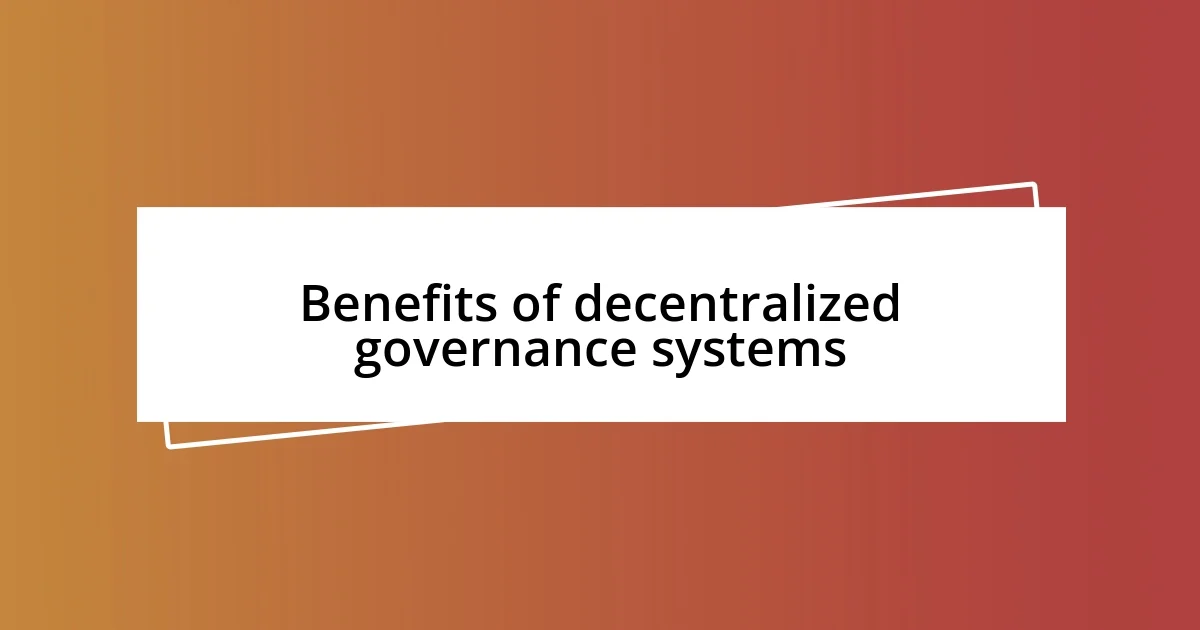
Benefits of decentralized governance systems
Decentralized governance systems can significantly increase the responsiveness and accountability of local governments. When authority is distributed, it often leads to quicker decision-making, as those closest to the issue at hand can address it without waiting for approvals from distant authorities. I recall a situation in my neighborhood where local leaders swiftly organized a cleanup event after a storm. This grassroots action not only addressed a pressing issue but also fostered a stronger community bond, illustrating how local governance can adapt quickly to immediate needs.
Some key benefits of decentralized governance include:
- Increased local engagement and empowerment, allowing residents to have a direct say in matters that impact their lives.
- Enhanced accountability, as local leaders are more accessible and answerable to their constituents.
- Better-tailored solutions, as local governments are often more in tune with the unique needs of their communities.
- More innovative approaches, as diverse local entities can experiment with different strategies to find what works best.
Experiencing a community that thrives on such systems made me realize the power of local wisdom in shaping effective governance. It’s a refreshing contrast to the often impersonal nature of centralized decision-making, reminding me of the importance of local voices in the broader democratic process.
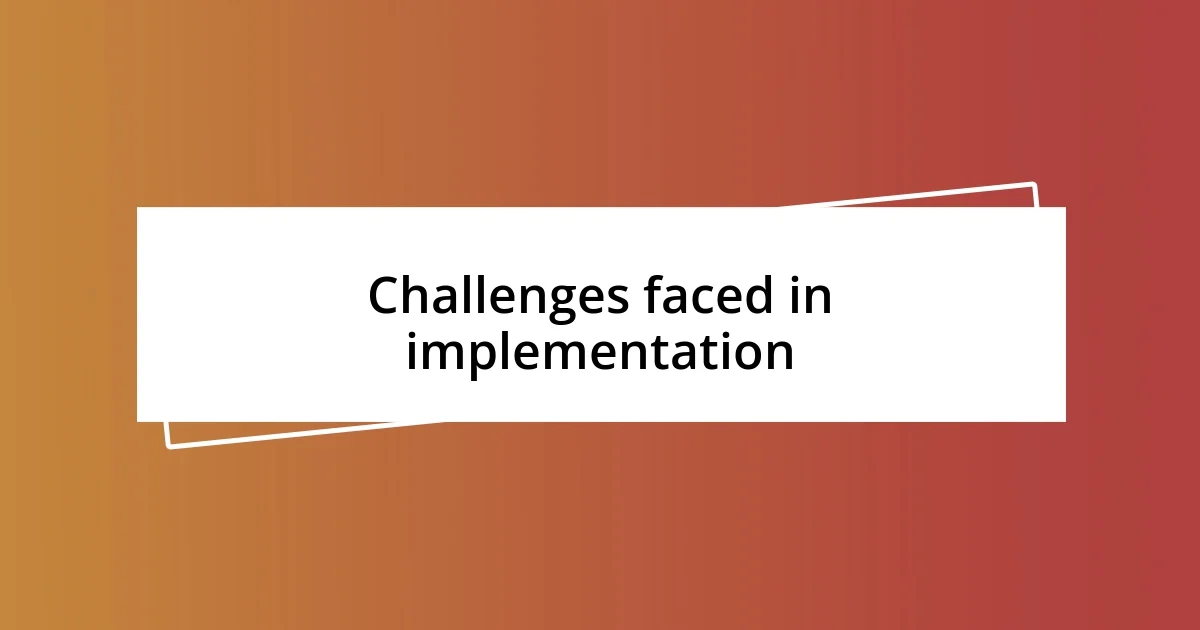
Challenges faced in implementation
Decentralization in governance indeed holds promise, but the implementation journey is fraught with challenges. One of the most pressing difficulties I’ve encountered is the inconsistency in resource allocation across different regions. For example, I once observed a local community struggling to gather adequate funds for a healthcare initiative while another nearby area had ample resources for similar projects. This discrepancy not only hampers progress but can also breed discontent among communities, leading them to feel undervalued or ignored. Have you seen similar instances where inequity has thwarted hopeful initiatives?
In my experience, another significant challenge lies in the varying levels of capacity and education among local leaders. I recall volunteering in a rural area where leaders were passionate yet lacked the necessary training to navigate complex governance issues. Their enthusiasm was palpable, but it often devolved into confusion and miscommunication, impacting community projects negatively. The importance of robust training programs can’t be overstated; they are crucial for equipping leaders with the skills to make informed decisions and engage with their constituents effectively.
Lastly, balancing local autonomy with a cohesive regional framework can feel like walking a tightrope. I’ve witnessed instances where local governments became too insular, losing sight of broader community needs and objectives. For example, in one case, a local council prioritized projects based on personal connections rather than community impact, which led to tension and division among residents. It’s evident that fostering collaboration among localities while still allowing them the freedom to govern is a delicate challenge that requires careful thought and strategic planning.
| Challenge | Description |
|---|---|
| Resource Allocation | Inconsistencies in funding and resources among regions can create inequities, affecting community progress. |
| Capacity of Local Leaders | Varying levels of training and expertise among local leaders can lead to ineffective governance and implementation issues. |
| Balancing Autonomy | Maintaining a balance between local independence and regional coherence is essential to prevent divisions and inefficiencies. |
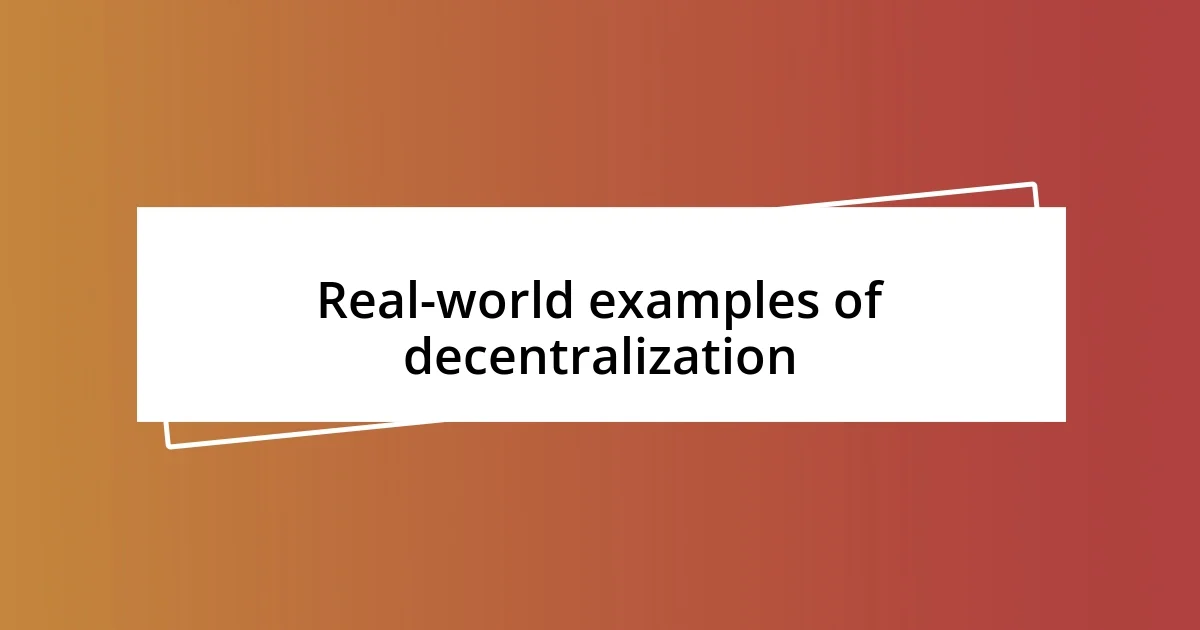
Real-world examples of decentralization
One striking example of decentralization can be seen in the city of Barcelona, where the local government has embraced a participatory budgeting approach. Residents actively engage in deciding how to allocate a portion of the city’s budget. I remember hearing firsthand stories from friends who had a direct role in shaping projects, like public park enhancements. This empowerment fosters a sense of ownership and connection among citizens. How often do we feel our voices are truly heard in larger governing systems?
In Switzerland, the concept of direct democracy epitomizes decentralization in governance. Citizens there can propose changes to the constitution or even bring issues to a referendum. I find it fascinating how this model encourages active participation and stimulates discussions among communities. It’s not just about voting; it involves continuous dialogue and debate, which makes the whole process more dynamic. Don’t you think it’s refreshing when people genuinely get involved in the decision-making process?
Looking at a different scale, the decentralized governance system implemented in Rwanda post-genocide showcases remarkable resilience and adaptability. Local governance councils, known as Umuganda, focus on community service and collective decision-making, addressing local challenges effectively. I spoke with a Rwandan friend who shared how these councils have revitalized neighborhoods, proving that inclusive governance can heal and unite. Isn’t it inspiring to see how communities can thrive when empowered to govern themselves?
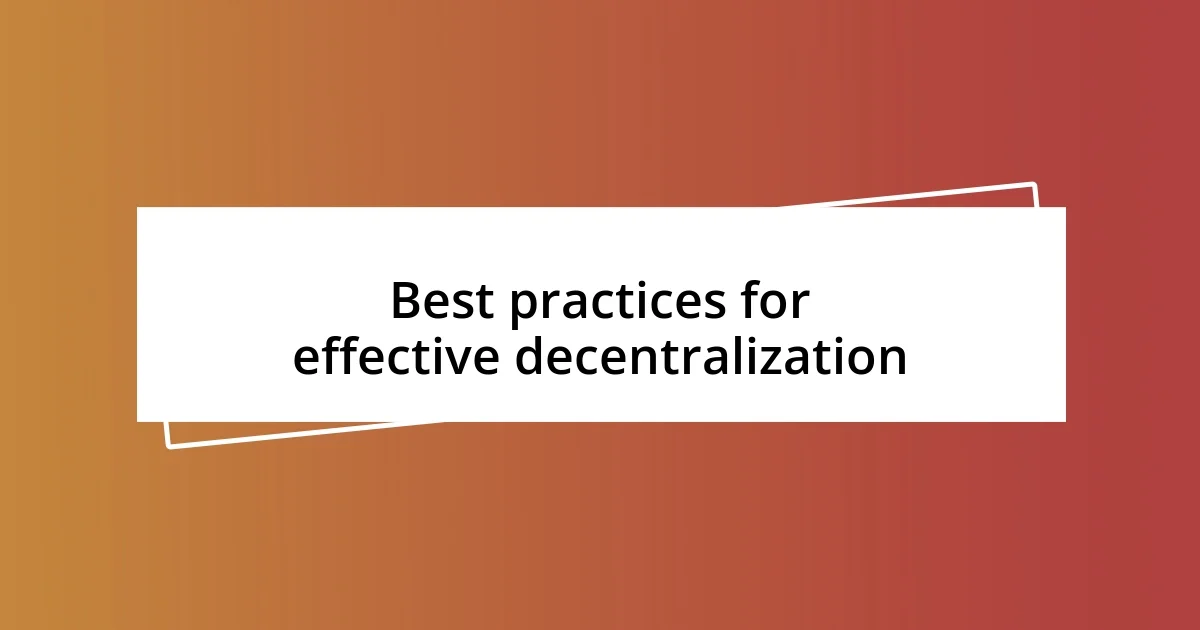
Best practices for effective decentralization
One of the best practices for effective decentralization involves establishing clear communication channels between local governments and the central authority. I remember attending a regional meeting where community representatives shared their challenges directly with policymakers. It was eye-opening to witness how open dialogue led to quick solutions for pressing local issues. Have you ever experienced how a simple conversation can spark change?
Another essential practice is prioritizing capacity-building initiatives for local leaders. From my experience facilitating workshops, I’ve seen firsthand how empowering individuals with the right tools and knowledge transforms communities. Just last month, I helped train a group of local leaders on financial literacy. They walked away not only with skills but also with an invigorated sense of purpose. This highlights the importance of investing in people who lead.
Lastly, fostering a culture of accountability is crucial. I once participated in a community assessment project where we held local leaders accountable for their commitments. The resulting feedback loop not only improved project outcomes but also created trust between leaders and citizens. Isn’t it rewarding when accountability ensures that everyone is working towards a common goal?
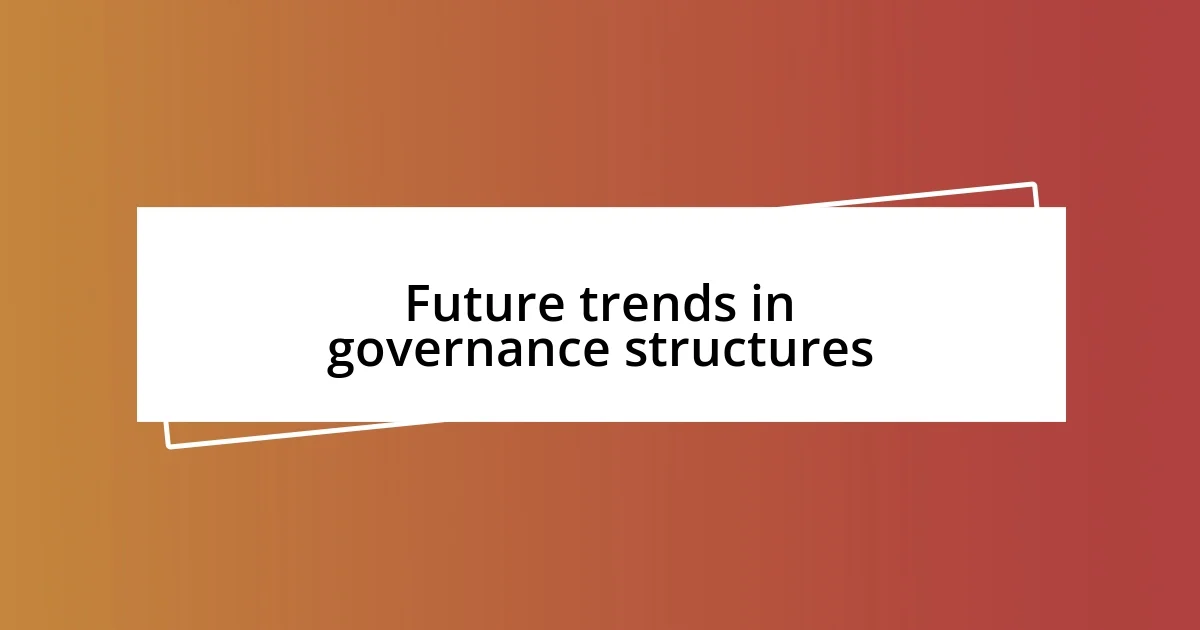
Future trends in governance structures
The future of governance structures is likely to see an increased emphasis on digital platforms that facilitate citizen engagement. I vividly recall participating in an online forum where my input on local issues helped shape future initiatives. It was amazing to feel my perspective mattered, and I believe that as technology continues to evolve, more people will experience this level of involvement, making governance more accessible and transparent. Don’t you think it’s thrilling to imagine a future where your voice is just a click away from influencing decision-making?
Moreover, collaborative governance models will probably gain traction as communities recognize the value of shared decision-making processes. During a community meeting I attended, different stakeholders, from local businesses to neighborhood groups, came together to address a block’s revitalization project. This collaboration not only resulted in innovative ideas but also fostered a sense of unity. Isn’t it remarkable how pooling resources and perspectives can lead to solutions that truly reflect the community’s needs?
I also foresee a growing importance placed on sustainability and social equity within governance frameworks. I remember a discussion I had with a friend involved in urban planning, who emphasized integrating green practices into governance. Communities are beginning to prioritize environmental issues and equitable resource distribution, indicating that our future governance could be more compassionate and forward-thinking. Wouldn’t it be wonderful to see systems that prioritize not just efficiency but also the well-being of both people and the planet?












